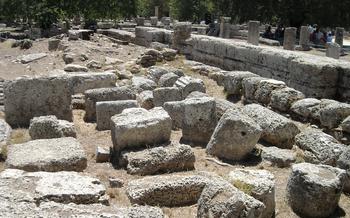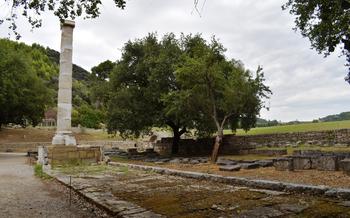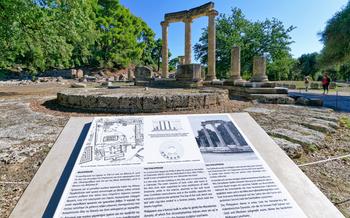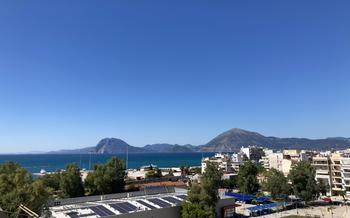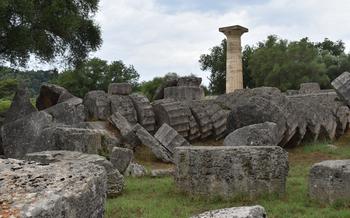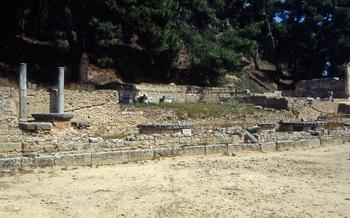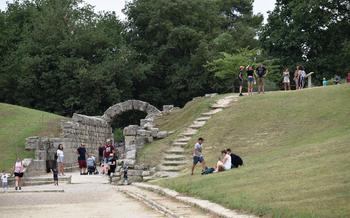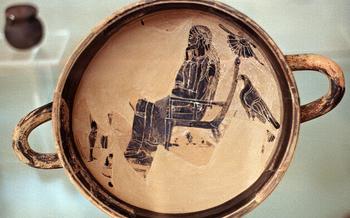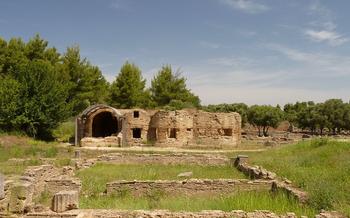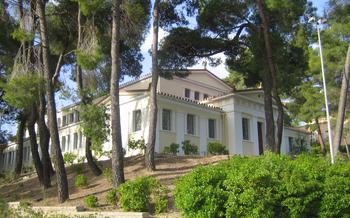
Alfeios River
- Olympia: A Historical Overview
- The Alfeios River: A Natural Wonder
- Exploring the Archaeological Site
- Witnessing the Olympic Games
- Discovering the Museum of Olympia
- Walking the Ancient Paths
- Biking Through the Countryside
- Tasting Local Delights
- Exploring Ancient Elis
- Visiting the Temple of Apollo Epicurius
- Discovering the Kaiafas Lake
- Learning About the Olive Oil Tradition
- Attending Cultural Events
- Exploring the Nearby Beaches
- Insider Tip: Hidden Gems of Olympia
Olympia: A Historical Overview
In the heart of Greece's Peloponnese region lies Olympia, an ancient city that holds a profound place in history. Renowned as the birthplace of the Olympic Games, Olympia served as a sacred sanctuary dedicated to the worship of Zeus, the king of the gods. For over a millennium, from the 8th century BC to the 4th century AD, Olympia was a vibrant center of athleticism, religious rituals, and cultural exchange.
In 776 BC, the first recorded Olympic Games took place in Olympia, marking the beginning of a tradition that would shape the course of ancient Greece and beyond. Every four years, athletes from across the Greek world gathered to compete in a variety of sports, including running, wrestling, discus, and javelin. These games were not merely sporting events; they were also religious festivals that celebrated the glory of Zeus and the Olympic ideals of excellence, fair play, and unity.
Olympia's significance extends beyond the Olympic Games. It was a major religious center, home to the majestic Temple of Zeus, one of the Seven Wonders of the Ancient World. The temple housed a colossal statue of Zeus, sculpted by the renowned artist Phidias, which was considered one of the greatest masterpieces of ancient art.
In the 4th century AD, with the rise of Christianity, the Olympic Games were abolished, and Olympia gradually fell into decline. However, its legacy lived on, inspiring the revival of the modern Olympic Games in 189Today, Olympia stands as a UNESCO World Heritage Site, a testament to the enduring power of the Olympic spirit and the rich cultural heritage of ancient Greece.
Archaeological excavations at Olympia have unearthed a wealth of ancient ruins and artifacts, including temples, statues, altars, and inscriptions. These discoveries have shed light on the city's history, religious practices, and artistic achievements. The ongoing preservation and restoration efforts at Olympia ensure that this sacred site continues to captivate visitors with its timeless beauty and historical significance.
The Alfeios River: A Natural Wonder
Flowing through the heart of Olympia, the Alfeios River adds to the region's natural beauty and historical significance. Its crystal-clear waters, lush vegetation, and diverse wildlife create a captivating landscape that has inspired poets, artists, and travelers for centuries.
In Greek mythology, the Alfeios River is associated with the goddess Artemis, the protector of nature and the hunt. According to legend, Artemis bathed in the river's waters, making it sacred and pure. The river's natural beauty and its connection to Artemis made it a place of worship and pilgrimage in ancient times.
Beyond its mythological significance, the Alfeios River was also a vital source of water for the ancient Greeks. It provided irrigation for crops, drinking water for the population, and a means of transportation for goods and people. The river's fertile banks were ideal for agriculture, and its waters supported a rich ecosystem of plants and animals.
Exploring the Archaeological Site
Olympia's archaeological site is a treasure trove of ancient ruins and artifacts that offer a glimpse into the grandeur of this ancient city. The site is vast, covering an area of over 100 hectares, so it's best to plan your visit and prioritize the must-see attractions.
One of the highlights of the site is the Temple of Zeus, an awe-inspiring structure that once housed the iconic statue of Zeus, one of the Seven Wonders of the Ancient World. The temple's massive columns and intricate sculptures are a testament to the skill and artistry of the ancient Greeks.
Another must-see is the Temple of Hera, dedicated to the goddess Hera, wife of Zeus. This temple is smaller than the Temple of Zeus but equally impressive, with its well-preserved Doric columns and intricate frieze depicting the labors of Hercules.
The Olympic Stadium, where the ancient Olympic Games were held, is another must-visit spot. Imagine the thrill and excitement as ancient athletes competed in various sports, cheered on by thousands of spectators. The stadium is remarkably well-preserved, and visitors can still see the starting line, the judges' stand, and the victory podium.
In addition to these major landmarks, the archaeological site is home to numerous other significant structures, including the Pelopion, a circular monument dedicated to the mythical hero Pelops; the Philippeion, a round temple built by Philip II of Macedon; and the Treasuries, small buildings where various Greek city-states stored their offerings to Zeus.
To make the most of your visit, consider taking a guided tour or using an audio guide. These tours provide valuable insights into the history, architecture, and significance of the site, bringing the ancient ruins to life.
Witnessing the Olympic Games
The Olympic Games, originating in ancient Olympia, hold immense historical significance. While the modern Olympics are held in various locations worldwide, Olympia continues to serve as the birthplace of this global sporting event. One of the key highlights for visitors to Olympia is the opportunity to witness the Olympic Flame Lighting Ceremony. This solemn and symbolic ritual marks the commencement of the Olympic Games and carries a deep connection to ancient Greek traditions.
The ceremony, steeped in history and symbolism, involves a series of rituals and processions that pay homage to the ancient Olympic Games. The flame is ignited using a parabolic mirror that harnesses the sun's rays, replicating the ancient method of fire-making. The torchbearer, chosen for their achievements and embodying the Olympic spirit, then carries the flame through the archaeological site, accompanied by a procession of athletes, officials, and dignitaries.
Attending the Olympic Flame Lighting Ceremony is a truly unforgettable experience that allows visitors to connect with the spirit of the ancient Olympic Games and feel the excitement and anticipation leading up to the global sporting event. It is a chance to witness history unfolding and to be a part of a tradition that has endured for centuries.
Discovering the Museum of Olympia
The Museum of Olympia is a treasure trove of ancient artifacts and artworks that provide a glimpse into the rich history and culture of Olympia. Its collection spans from prehistoric times to the Roman period, offering visitors a comprehensive overview of the region's artistic and cultural heritage.
Among the highlights of the museum are the famous Hermes of Praxiteles, a stunningly realistic marble sculpture that captures the essence of the Greek god, and the Nike of Paionios, a winged victory statue that once adorned the Temple of Zeus. Other notable exhibits include bronze statues, pottery, jewelry, and coins, each offering a unique perspective on ancient Greek life and craftsmanship.
Visitors should allocate ample time to explore the museum's various galleries and exhibits, as each piece holds its own significance and story. Guided tours and audio guides are available to enhance the experience and provide deeper insights into the artifacts and their historical context.
The Museum of Olympia is a must-visit destination for anyone interested in ancient Greek art and culture. Its collection is a testament to the creativity and skill of the ancient Greeks and offers a tangible connection to the past.
Walking the Ancient Paths
Strolling along the ancient paths of Olympia, one can't help but feel a profound connection to the past. These paths, worn smooth by the footsteps of countless pilgrims, athletes, and visitors, offer a unique opportunity to follow in the footsteps of history.
The archaeological site is crisscrossed by a network of well-marked trails, allowing visitors to explore the ruins at their own pace. One of the most popular trails leads from the Temple of Zeus to the Alfeios River, passing by the Temple of Hera, the Olympic Stadium, and other significant landmarks. Along the way, visitors can admire the natural beauty of the site, with its towering trees, lush vegetation, and tranquil riverbanks.
For those seeking a more challenging experience, there are trails that venture further afield, into the surrounding countryside. These trails offer breathtaking views of the Alfeios River valley, olive groves, and distant mountains. The paths are generally well-maintained, but it's advisable to wear sturdy shoes and bring water and snacks, as there are no facilities along the way.
Whether you choose a short stroll or a longer hike, walking the ancient paths of Olympia is a rewarding experience that allows you to connect with the history, nature, and spirit of this sacred place. So lace up your shoes, grab your camera, and embark on a journey through time.
Biking Through the Countryside
Biking is another fantastic way to explore the picturesque countryside surrounding Olympia. Pedal along scenic routes that offer breathtaking views of the Alfeios River, verdant olive groves, and charming traditional villages. Immerse yourself in the natural beauty of the region as you cycle through tranquil landscapes and discover hidden gems.
Rent a bicycle from local shops in Olympia and embark on a self-guided tour. Alternatively, join an organized bike tour to benefit from the expertise of local guides and explore lesser-known trails. These tours often provide insights into the history, culture, and natural heritage of the area, making your biking experience even more enriching.
Remember to pack a camera to capture the stunning scenery along the way. Stop at quaint villages to savor local delicacies, interact with friendly locals, and soak up the authentic Greek atmosphere. Whether you're an experienced cyclist or a leisurely rider, biking through the Olympia countryside promises an unforgettable adventure.
Tasting Local Delights
The Olympia region is a culinary paradise, offering a tantalizing array of fresh produce, olive oil, and traditional dishes that will delight your taste buds. Immerse yourself in the local cuisine by visiting tavernas and restaurants that serve regional specialties such as grilled meats, fresh seafood, and homemade pies bursting with flavor. Don't miss the opportunity to learn about Greek cuisine and cooking techniques through cooking classes or food tours. Savor the aromas and flavors of the local delicacies, and let the culinary delights of Olympia create lasting memories of your journey.
Exploring Ancient Elis
In the vicinity of Olympia lies the ancient town of Elis, steeped in a rich history that dates back to the Classical era. Discover its well-preserved ancient theater, an impressive structure that still hosts captivating performances and events, echoing the cultural vibrancy of bygone centuries. Delve into the town's past at the Archaeological Museum of Ancient Elis, which houses a collection of artifacts that shed light on its significance. Explore the remnants of the Venetian fortress, a testament to the town's resilience and strategic importance. Combine your visit to Ancient Elis with a refreshing day trip to the idyllic beaches nearby or immerse yourself in the charm of the picturesque village of Krestena, where time seems to stand still.
Visiting the Temple of Apollo Epicurius
A Masterpiece of Ancient Architecture
As you embark on your journey through Olympia, don't miss the opportunity to visit the awe-inspiring Temple of Apollo Epicurius, a UNESCO World Heritage Site located a short distance away. Perched majestically atop a hill overlooking the enchanting countryside, this temple is a marvel of ancient architecture and a testament to the ingenuity of the Greek people.
The Temple of Apollo Epicurius, dedicated to the Greek god of healing and prophecy, was constructed in the 5th century BC. Its exceptional state of preservation and unique design set it apart from other ancient temples. As you approach the temple, you'll be captivated by its harmonious proportions and exquisite details.
One of the most striking features of the temple is its unusual location. Unlike most Greek temples, which were typically built in urban centers, the Temple of Apollo Epicurius was constructed in a remote and secluded spot, offering visitors a serene and contemplative atmosphere.
As you explore the temple, take a moment to admire its well-preserved sculptures and architectural elements. The intricately carved metopes and pediments depict scenes from Greek mythology, showcasing the exceptional artistry of the ancient Greeks.
From the temple's elevated position, you'll be rewarded with breathtaking panoramic views of the surrounding landscape. Gaze out over the rolling hills, olive groves, and distant mountains, and let the beauty of nature wash over you.
Visiting the Temple of Apollo Epicurius is a journey back in time, offering a glimpse into the religious and cultural practices of ancient Greece. This architectural masterpiece is a must-see for anyone interested in history, architecture, or simply the wonders of the ancient world.
Discovering the Kaiafas Lake
Nestled amidst the picturesque landscapes of Elis, the Kaiafas Lake beckons nature enthusiasts with its serene beauty and diverse ecosystems. Surrounded by lush vegetation, the lake provides a tranquil retreat for those seeking respite from the urban hustle. As you approach the lake, the air fills with the melodious chirping of birds, creating a harmonious symphony that sets the tone for your visit.
The crystal-clear waters of Kaiafas Lake reflect the vibrant hues of the surrounding flora, creating a captivating spectacle. The lake's tranquil ambiance invites visitors to immerse themselves in the serenity of nature, whether through peaceful walks along its shores, leisurely picnics beneath the shade of ancient trees, or engaging in birdwatching expeditions.
For those seeking a more active experience, the lake offers opportunities for hiking and exploring the diverse trails that wind through the surrounding hills. As you traverse these paths, you'll encounter a rich tapestry of wildflowers, aromatic herbs, and ancient olive groves, each contributing to the unique charm of the landscape.
A visit to Kaiafas Lake is not complete without witnessing the magical colors that dance across its surface during sunset. As the golden hues of the setting sun bathe the lake in a warm glow, the surrounding environment transforms into a breathtaking canvas of light and shadow, creating an unforgettable spectacle that will linger in your memories long after your visit.
Learning About the Olive Oil Tradition
Olive oil holds a prominent place in Greek culture and cuisine, and the region of Olympia is no exception. The fertile lands surrounding the ancient site are dotted with olive groves, where farmers have cultivated olives for centuries using traditional methods passed down through generations. Visitors to Olympia have the unique opportunity to immerse themselves in this time-honored tradition and learn about the art of olive oil production.
Local olive mills, often family-run businesses, welcome visitors to witness the process of transforming freshly harvested olives into golden, flavorful oil. Guided tours provide insights into the various stages of production, from harvesting and sorting the olives to pressing, extracting, and storing the oil. Visitors can observe the traditional stone mills used to crush the olives and the modern machinery that helps streamline the process.
The highlight of the experience is undoubtedly the opportunity to taste the freshly pressed olive oil. Its distinct aroma and rich, fruity flavor are a testament to the care and expertise that goes into its production. Visitors can savor the oil on its own, paired with bread or drizzled over a traditional Greek salad.
Purchasing a bottle of local olive oil is a cherished souvenir from Olympia. Its unique flavor and connection to the region's rich history make it a treasured gift for family and friends back home. Whether you prefer a mild or robust flavor, the olive oil from Olympia is sure to delight your palate and transport you back to the idyllic landscapes of Greece.
Attending Cultural Events
Olympia is not only a place of historical significance but also a vibrant cultural hub. Throughout the year, the city hosts a variety of cultural events and festivals that celebrate its rich heritage and traditions. One of the highlights is the International Festival of Ancient Olympia, which takes place during the summer months. This prestigious event showcases performances of ancient Greek drama and music, transporting visitors back in time to the era of the Olympic Games.
Other notable events include art exhibitions, concerts, and traditional dance performances that showcase the diverse talents of local artists and performers. These events are a wonderful opportunity to immerse yourself in Greek culture and experience the warm hospitality of the local community. Be sure to check local calendars and tourist information centers for event listings so you don't miss out on any of these exciting cultural experiences.
Exploring the Nearby Beaches
The Peloponnese peninsula is blessed with an abundance of stunning beaches, and Olympia is no exception. A short drive from the ancient site, visitors can discover a string of pristine beaches that offer a welcome respite from the historical exploration.
Kourouta Beach, located just 10 kilometers from Olympia, is a popular choice for its crystal-clear waters, soft golden sands, and shallow depths, making it ideal for families with young children. The beach is well-organized, with sunbeds and umbrellas available for rent, as well as a selection of tavernas and cafes serving fresh seafood and refreshing drinks.
For those seeking a more secluded experience, Skafidia Beach, situated a few kilometers further south, offers a tranquil haven. Surrounded by lush greenery and towering cliffs, this picturesque beach boasts crystal-clear waters perfect for swimming and snorkeling. Visitors can find a secluded spot to relax on the sandy shore or explore the underwater world teeming with marine life.
Venture a little further south, and you'll reach the charming village of Zacharo, home to a stunning stretch of coastline. Zacharo Beach is renowned for its long, sandy beach, ideal for long walks, sunbathing, and swimming. The beach is well-equipped with sunbeds, umbrellas, and water sports facilities, providing a range of activities for visitors of all ages.
Whether you seek relaxation, adventure, or a combination of both, the beaches near Olympia offer something for every traveler. Immerse yourself in the natural beauty of these coastal gems and create unforgettable memories under the warm Greek sun.
Insider Tip: Hidden Gems of Olympia
Beyond the popular attractions, Olympia offers a treasure trove of hidden gems that are waiting to be discovered. Venture off the beaten path and uncover the serene beauty of the Alfeios River's waterfalls and natural pools. These secluded spots invite you to immerse yourself in nature's tranquility, away from the crowds.
The picturesque village of Lala, nestled amidst rolling hills, offers a glimpse into traditional Greek life. Stroll through its narrow streets, admire the charming stone houses adorned with colorful flowers, and engage with the friendly locals. Lala is also known for its vibrant crafts scene, where you can discover handmade ceramics, textiles, and other unique creations.
Don't miss the opportunity to experience the authentic flavors of Olympia at the local markets. Immerse yourself in the lively atmosphere as you browse stalls laden with fresh produce, aromatic spices, and handmade delicacies. Engage with the vendors, learn about local culinary traditions, and savor the flavors of the region.
